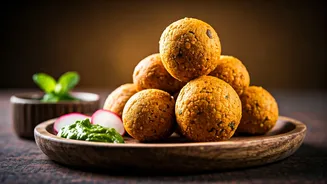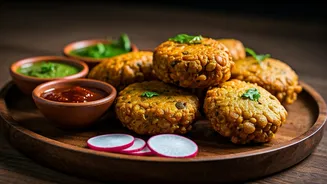Introduction: The Nutty World
Nuts and seeds are nature's little powerhouses, delivering a wealth of protein, healthy fats, and vital nutrients. Often overlooked, they can significantly
boost our daily intake of essential vitamins and minerals. They provide a satisfying snack, keep you feeling full, and offer a variety of health benefits. From the familiar almond to the exotic chia seed, each option contributes unique elements to our well-being, making them a valuable part of a balanced diet. By learning about these nutritional champions, we can easily enhance our diet and overall health.
Almonds: The Nutty Classic
Almonds are a popular choice, loaded with vitamin E, magnesium, and fiber. They provide a good dose of monounsaturated fats, known for heart health benefits. Enjoy almonds as a snack, add them to your morning cereal, or sprinkle them on salads. They are easily available and versatile. Regularly consuming almonds can help manage blood sugar levels and improve skin health. Almonds' satisfying crunch makes them a perfect substitute for less nutritious snacks.
Walnuts: Brain Boosters
Walnuts stand out due to their high omega-3 fatty acid content, crucial for brain health. They are rich in antioxidants and can help reduce inflammation. Walnuts are often consumed to support brain function and memory. Adding walnuts to your diet may improve cognitive performance and contribute to reducing the risk of heart disease. Use walnuts in salads, bake them into your favorite desserts, or eat them as a nutritious snack throughout the day.
Cashews: Creamy Delights
Cashews offer a creamy texture and a slightly sweet flavor. They are a good source of magnesium, copper, and antioxidants. Magnesium is vital for bone health, while copper aids in producing energy. Cashews are versatile and frequently used in cooking. They are wonderful as a snack or incorporated into vegetarian dishes. The creamy texture makes them a fantastic addition to sauces and desserts. Consuming cashews can assist in maintaining bone density and overall well-being.
Pistachios: Vibrant Treats
Pistachios are visually appealing with their green color and distinct flavor. These nuts are high in antioxidants and contain a substantial amount of fiber. They help in managing blood sugar and improve cardiovascular health. Pistachios offer a unique blend of flavor and nutrients. They make a great standalone snack and can be added to salads or baked goods. Regular pistachio consumption can contribute to eye health and weight management.
Chia Seeds: Tiny Giants
Chia seeds are tiny but full of nutrition, recognized for their high fiber and omega-3 fatty acids. They also contain significant amounts of calcium and antioxidants. These seeds help with digestion and support heart health. Incorporate chia seeds into smoothies, yogurt, or puddings. They absorb liquid, creating a gel-like texture that aids in feeling full. Consuming chia seeds supports digestive health and provides sustained energy.
Flaxseeds: Fiber Powerhouses
Flaxseeds are excellent sources of fiber and omega-3 fatty acids. They can improve heart health and help regulate blood sugar levels. Flaxseeds are commonly used in baking, added to cereals, or sprinkled on salads. They have a slightly nutty flavor. Consuming flaxseeds regularly can contribute to healthy digestion and aid in managing cholesterol. For optimal absorption of nutrients, it's best to grind flaxseeds before consumption.
Sunflower Seeds: Versatile Bites
Sunflower seeds are a good source of vitamin E, magnesium, and selenium. These nutrients support immune function and offer antioxidant benefits. Sunflower seeds can be eaten as a snack or added to salads, baked goods, or trail mixes. They offer a satisfying crunch and mild flavor. They can contribute to skin health and protect against cellular damage. Adding sunflower seeds to your diet adds a nutritious element.
Pumpkin Seeds: Pepitas Power
Pumpkin seeds, also called pepitas, are rich in magnesium, zinc, and antioxidants. They are a valuable source of plant-based protein and contribute to bone health and immune function. Pumpkin seeds can be roasted and enjoyed as a snack or added to salads and cereals. The mild flavor and crunchy texture make them adaptable to various recipes. Regular consumption of pumpkin seeds supports prostate health and overall wellness.
Hazelnuts: Rich and Flavorful
Hazelnuts deliver a rich, buttery taste and are packed with vitamin E and healthy fats. They offer antioxidant benefits and support heart health. They are often used in desserts, such as chocolates, or as a snack. Hazelnuts are delicious on their own or added to various recipes. The rich flavor profile adds complexity to dishes. Eating hazelnuts can enhance skin health and reduce the risk of chronic diseases.












